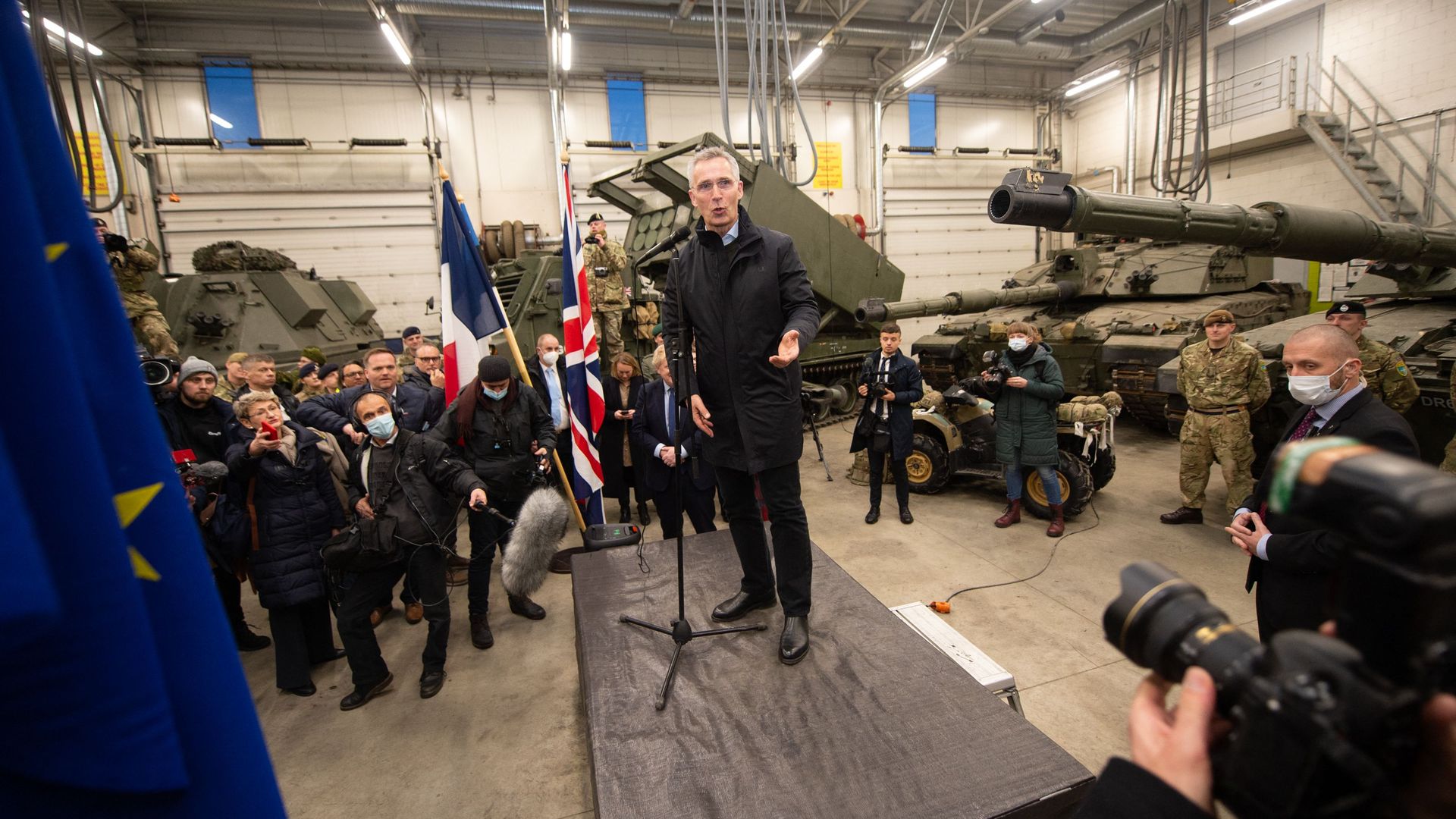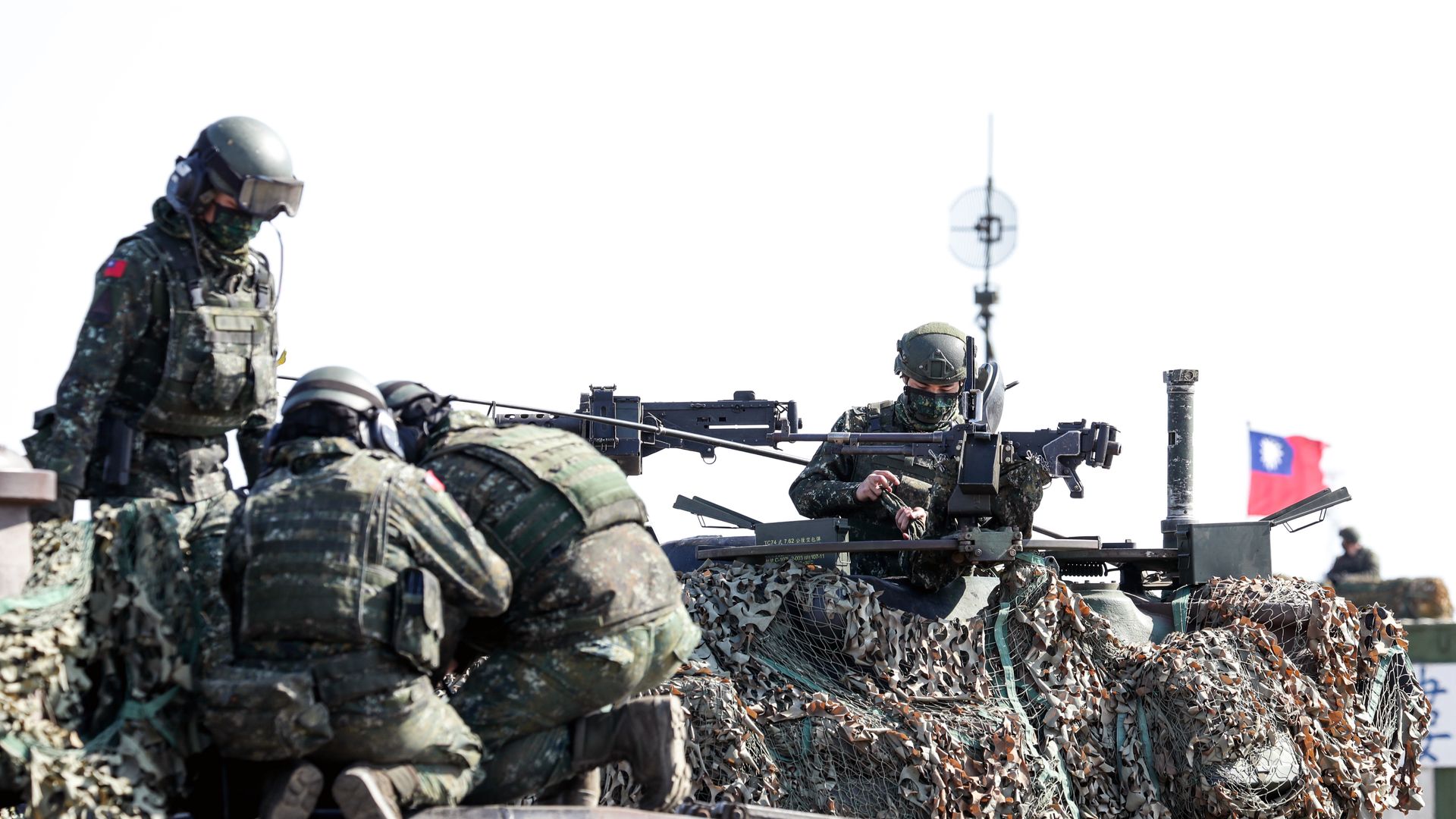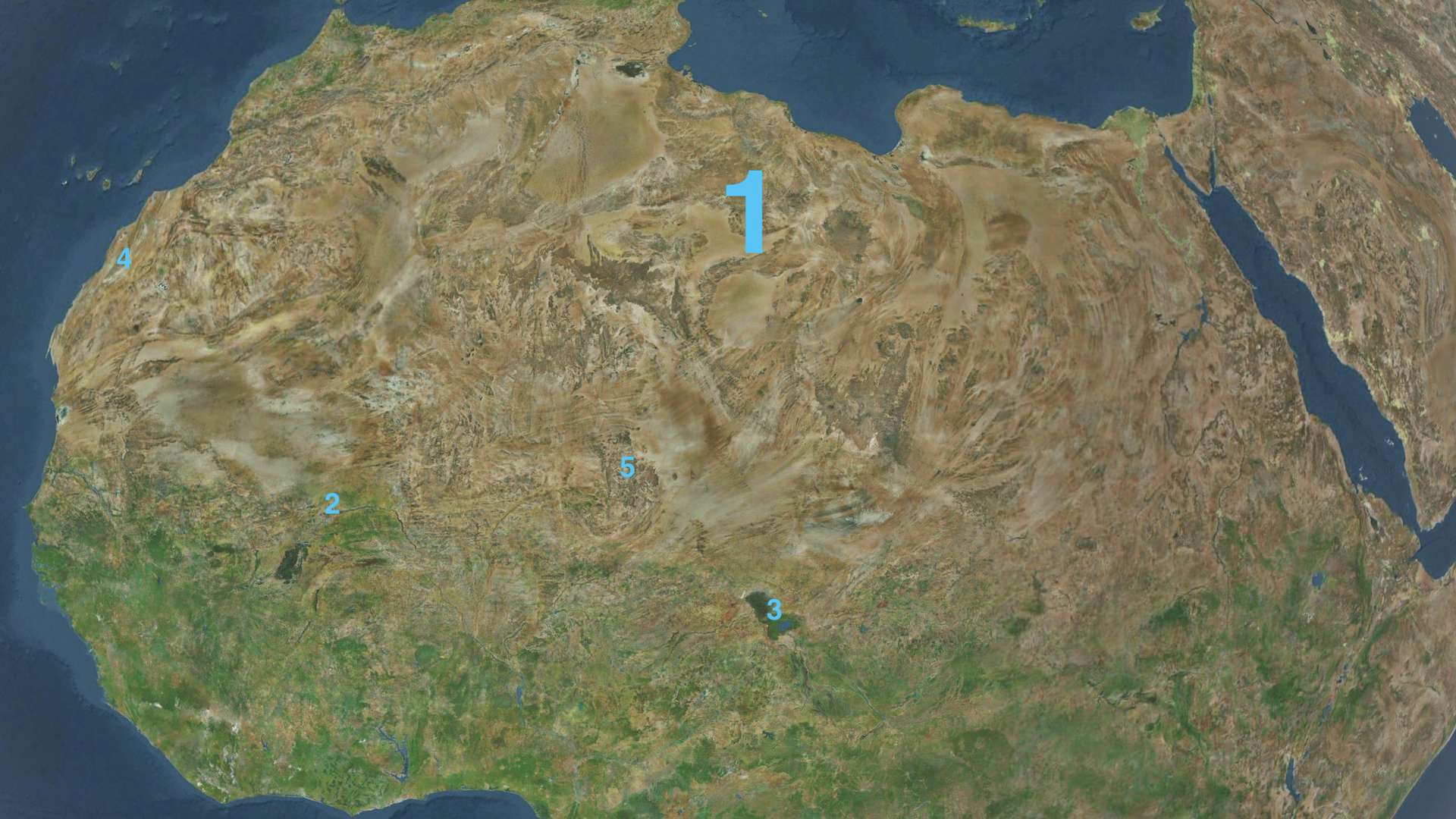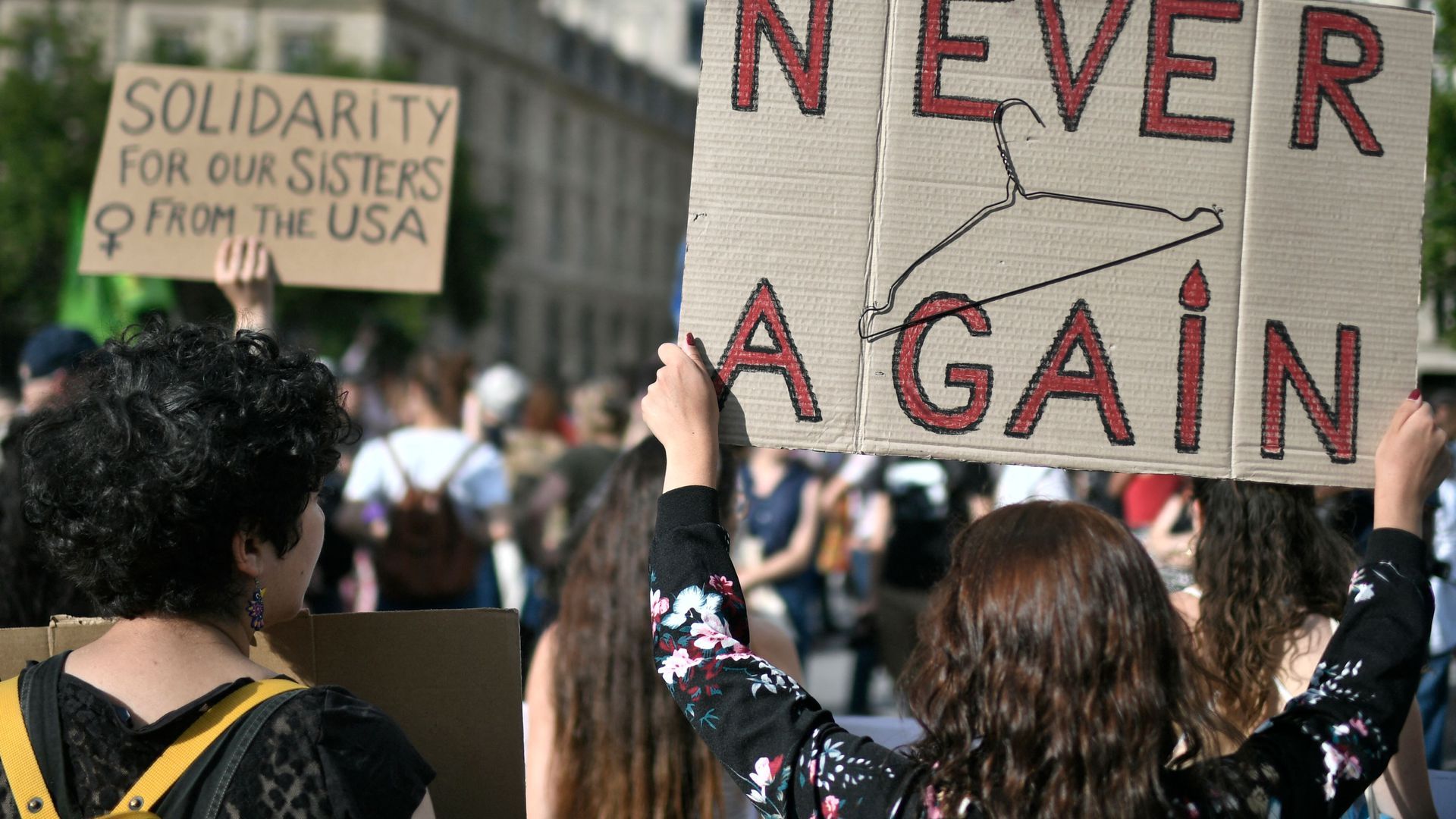| | | | | | | | | | | Axios World | | By Dave Lawler · Jun 27, 2022 | | Welcome back to Axios World. - Tonight's edition (1,977 words, 7½ minutes) comes to you from D.C. and visits the G7, NATO, Taiwan and more.
- Heads-up: I'm heading on vacation tomorrow but back in your inbox next Thursday.
- A recommendation: If you ever have a chance to go to a Korean baseball game, do it. The chants are incredible.
Situational awareness: G7 leaders this evening condemned a Russian strike today on a Ukrainian shopping center as a "war crime." New arrival? Subscribe. | | | | | | 1 big thing: NATO sets its course for the 2020s |  | | | NATO Secretary-General Stoltenberg during a visit to Estonia in March. Photo: Raigo Pajula/AFP via Getty | | | | NATO will undertake "the biggest overhaul of collective defense and deterrence since the Cold War" at this week's key summit in Madrid, Secretary-General Jens Stoltenberg said today. Driving the news: Stoltenberg announced that NATO will increase the number of high-readiness forces to "well over 300,000" from around 40,000, and it will step up its presence on its eastern flank with Russia. NATO members are also finalizing their first "strategic concept" since 2010. - The last strategy document came during the Obama administration's "reset" with Moscow and called for "a true strategic partnership" with Moscow.
- At that time, the threat picture was very different. There weren't yet NATO troops based in eastern European members like the Baltic states, the Economist notes. Now the focus is on sufficiently increasing NATO's presence there to deter any Russian aggression.
- "The relationship has fundamentally changed, and the strategic concept that will be adopted in Madrid reflects that," says Ivo Daalder, who was Obama's ambassador to NATO from 2009 to 2013. "This is the core business again of NATO. It's defending NATO territory against a real, imminent threat from Russia."
Russia's invasion of Ukraine put two core questions for the future of the alliance on hold, at least partially: How big a role should the U.S. play in defending Europe vs. European countries themselves, and how big a role should NATO play in responding to a rising China? - Both questions will feature in this week's discussions, but less prominently than they might have if Vladimir Putin's invasion hadn't underscored the relevance of an alliance French President Emmanuel Macron said just three years ago was approaching "brain death."
- Existing NATO members are increasing their defense spending, albeit unevenly, while Finland and Sweden are now attempting to come inside the "Article 5" mutual defense umbrella.
China will appear in the strategic concept for the first time, Daalder says, but he's only expecting one paragraph on China and says the "overwhelming focus" will be on Russian aggression. - It's not yet clear what that paragraph will say, as there's an internal debate over how to refer to China (France and Germany reportedly want softer language).
- Australia, Japan, New Zealand and South Korea will also attend the summit as a signal of the alliance's cooperation with Pacific partners. The leaders of Japan and South Korea are expected to hold a trilateral meeting with President Biden.
Perhaps the biggest question hanging over the summit is whether the U.S. and its allies will be able to convince Turkish President Recep Tayyip Erdoğan to lift a roadblock on Finnish and Swedish membership, which requires unanimity. - Erdoğan claims the Nordic NATO aspirants harbor Kurdish separatists, and he may well seek to leverage the standoff to extract concessions from NATO countries and rally his base at home.
- He also wants a meeting with Biden, Daalder says: "I'm confident that if it takes a bilateral with Biden to get Erdogan to shift course on Finland and Sweden, we'll see that [in Madrid]."
- "I think it is crucially important for the alliance that there is an agreement in Madrid to invite Finland and Sweden to join."
What to watch: Top of the agenda in Madrid will of course be Ukraine, and in particular how to help Kyiv transition from Soviet-era to NATO-caliber weaponry. |     | | | | | | 2. Official: S. Korea expects U.S. to intervene if China invades Taiwan |  | | | Taiwanese forces conduct a drill in 2021. Photo: I-Hwa Cheng/Bloomberg via Getty Images | | | | SEOUL, South Korea — South Korea would expect the U.S. to respond militarily to a Chinese invasion of Taiwan, according to a South Korean official. Why it matters: China's threats to bring the self-governing island under its control, by force if necessary, present perhaps the most likely scenario for war with the U.S. As a U.S. ally, South Korea would be wary of getting pulled into such a conflict, the official said, but would worry about its own security if the U.S. did not respond with force. Setting the scene: The official, who declined to be named, made the comments during a discussion of the new South Korean administration's foreign policy priorities with a small group of reporters in Seoul. - The official said China currently poses security "risks" to South Korea but not a direct "threat." However, the official cited a potential incident in the Taiwan Strait as a scenario that could change that equation.
- Asked by Axios whether Seoul would want the U.S. to respond militarily to an invasion, the official said South Korea was "more comfortable" with the idea that the U.S. would respond — even though that would likely lead to a request for military support from the U.S. and Japan, a fellow U.S. ally.
- The official did not say whether South Korea would be willing to send its own troops.
What they're saying: If the U.S. stood aside over Taiwan, it would be seen as a signal that the U.S. might not defend South Korea against an attack from the north, the official said. - "We probably take for granted that if China attacks Taiwan, the U.S. will engage," the official added.
Between the lines: The U.S. has a mutual defense treaty with South Korea, but no commitment to defend Taiwan or set position as to whether it would do so. - Even as President Biden has said three times that the U.S. would defend Taiwan, the White House continues to insist there has been no change in its "strategic ambiguity" policy.
Go deeper. |     | | | | | | 3. G7 debates cap on Russia's oil price |  | | | Illustration: Gabriella Turrisi/Axios | | | | The G7 is debating an unprecedented price cap on Russian energy exports during its summit in Germany. Why it matters: Sky-high oil prices are fueling Moscow's war effort in Ukraine and blunting the effect of Western sanctions. U.S. officials believe capping the price of Russian exports could potentially hit the Kremlin's revenues and also possibly help slow inflation. - The plan would require those shipping or importing Russian oil to guarantee that it won't be sold above a certain price. That price would have to be high enough that Russia keeps exporting, but low enough to significantly dent Moscow's profits.
- No deal is expected this week, but national security adviser Jake Sullivan told reporters that the leaders were likely to task their respective energy and finance ministers with designing a plan.
- Yes, but: This has never been tried before, and some experts are pessimistic as to how and whether it would work — and whether other big oil consumers like China and India will cooperate.
The big picture: There is a tug of war going on at the G7 and beyond over the balance between securing fossil fuel supplies in the short term and transitioning to clean energy in the long run, Axios Generate co-author Andrew Freedman writes. - That stands in stark contrast to last year's G7 meeting, where climate change was top of the agenda.
Go deeper: U.S. to contribute $200 billion to G7 infrastructure partnership |     | | | | | | A message from Axios | | Win the race for (remote) talent | | |  | | | | Reach over 750,000 smart professionals in the fastest growing cities in America. Axios now has job boards to get your openings in front of qualified candidates. Post your job opportunities on Axios. | | | | | | Bonus: Where in the world? |  | | | Screengrab via Apple Maps | | | | Today we're visiting the world's largest hot desert. We'll start easy and then get trickier. Can you name... - The desert.
- Real-life city in Mali whose name is sometimes used to denote a faraway place ("from here to ____").
- Large, shallow, freshwater lake that gave its name to a country and serves as a much-needed water source for tens of millions.
- Disputed territory partially controlled by Morocco.
- Landlocked country with more than 80% of its territory located in the Sahara.
Scroll to the bottom for the answer. |     | | | | | | 4. Global news roundup: High prices, major unrest | | 1. Sri Lanka will shut schools and reserve all remaining fuel for essential services like health care and public transport as the near-bankrupt government struggles to combat severe shortages. - Meanwhile in Ecuador, President Guillermo Lasso's promise of a small cut to fuel prices has failed to stem anti-government protests led by Indigenous groups, which could force the government to suspend all oil production.
- And in Peru, truckers and some agricultural workers have launched a strike over high fuel and fertilizer prices.
2. Chinese President Xi Jinping is expected to visit Hong Kong later this week to attend the swearing-in of the city's new chief executive and mark the 25th anniversary of Hong Kong's return to Chinese control. - Why it matters: This will be Xi's first trip outside mainland China since the pandemic began, and his first visit to Hong Kong since the implementation of the city's draconian security law.
- Worth noting: China recently launched its third aircraft carrier. The U.S. has 11.
4. WNBA star Brittney Griner's detention was extended for another six months during a preliminary hearing today, four months after she was arrested at a Moscow airport. Her trial is due to begin July 1, per AP. 5. Russia is set to default on its foreign-currency sovereign debt after bond holders reported the Kremlin missed two payments late Sunday. |     | | | | | | 5. The global impact of the end of Roe |  | | | Protesters hold signs during a rally in support of worldwide abortion rights in Paris on June 24. Photo: Tephane de Sakutin/AFP via Getty Images | | | | Rights advocates and world leaders are warning the U.S. Supreme Court decision overturning Roe v. Wade could have far-reaching consequences for reproductive rights worldwide, Axios' Laurin-Whitney Gottbrath writes. The latest: In response to the end of Roe, Israel eased its regulations on abortion access. In France, lawmakers with President Emmanuel Macron's party introduced legislation that would enshrine abortion rights in the country's constitution. - "What happened elsewhere must not happen in France," French MP Marie-Pierre Rixain tweeted.
- "The ruling ... reminds us that there is always a risk of going backward," tweeted Antonia Orellana, minister of women and gender equity in Chile, noting "In Latin America, we advance on the path of rights."
- "The fallout from this calculated decision will ... reverberate worldwide, emboldening other anti-abortion, anti-woman and anti-gender movements and impacting other reproductive freedoms," Alvaro Bermejo, the director-general of the International Planned Parenthood Federation, said in a statement.
Some outside the U.S. praised the Supreme Court decision. - "The fact that a large country with a long democratic tradition has changed its position on this issue also challenges the whole world," the Vatican's Pontifical Academy for Life said in a statement.
The big picture: With Friday's decision, the U.S. became just the third country to roll back abortion access since 1994, according to the Center for Reproductive Rights. In the last 25 years, nearly 60 countries have liberalized their abortion laws. Go deeper: Global reactions to the Roe ruling |     | | | | | | 6. One to watch: Iran talks are back on |  | | | Iran envoy Rob Malley. Photo: Brendam Smialowski/AFP via Getty | | | | Indirect talks between Iran and the U.S. aimed at reviving the 2015 nuclear deal will resume tomorrow in Qatar, with the EU serving as mediator, Axios Barak Ravid reports. State of play: U.S. Iran envoy Rob Malley arrived in Doha on Monday and met with the Qatari foreign minister ahead of the resumption of talks. Senior State Department officials tell Axios they agreed to explore the paths forward, but stressed that they have low expectations. - Qatar has been working behind the scenes in recent months to use its close relations with both the U.S. and Iran in order to try to bridge the gaps left over from several rounds of talks in Vienna.
- But aside from coming back to the table after a three-month hiatus, the Iranians didn't present any dramatically different positions during a visit to Tehran this weekend by EU foreign policy chief Josep Borrell, according to a U.S. official.
What they're saying: Borrell said at the end of his visit that Iran's demand that the Islamic Revolutionary Guard Corps be removed from a U.S. terror blacklist remains a sticking point that will have to be discussed in Qatar. - Iranian Foreign Minister Hossein Amir-Abdollahian, meanwhile, said today that he hoped the U.S. and Europeans would show "realistic behavior" so that an agreement could be reached.
Go deeper: Iran launches rocket as nuclear talks set to resume |     | | | | | | 7. Stories we're watching |  | | | Girls in Bali take in traditional Usaba Sambah celebrations from a wooden swing. Photo: Robertus Pudyanto/Getty Images | | | - Ukraine latest: Shopping center strike; Strikes in Kyiv; Ukrainian troops withdraw from Severodonetsk; G7 bans Russian gold
- At least 22 dead in South African nightclub, cause unknown
- Canada wants in on the startup boom
- Prince Charles denies wrongdoing over Qatar donations
- Global heat records fall
- Bullring stand collapses in Colombia
- Funeral held for British journalist killed in Brazil
Quoted: "At some point, there's going to be a tragedy that no one wants. … Everybody knows what's happening here." — Brazilian President Jair Bolsonaro Sunday, continuing to baselessly suggest October's election will be stolen. He trails by around 12% in the polls. |     | | | | | | A message from Axios | | Win the race for (remote) talent | | |  | | | | Reach over 750,000 smart professionals in the fastest growing cities in America. Axios now has job boards to get your openings in front of qualified candidates. Post your job opportunities on Axios. | | | | Answers: 1. Sahara; 2. Timbuktu; 3. Lake Chad; 4. Western Sahara, or Sahrawi Arab Democratic Republic; 5. Niger. |  | It's called Smart Brevity®. Over 300 orgs use it — in a tool called Axios HQ — to drive productivity with clearer workplace communications. | | | | | | Axios thanks our partners for supporting our newsletters. If you're interested in advertising, learn more here.
Sponsorship has no influence on editorial content. Axios, 3100 Clarendon Blvd, Suite 1300, Arlington VA 22201 | | | You received this email because you signed up for newsletters from Axios.
Change your preferences or unsubscribe here. | | | Was this email forwarded to you?
Sign up now to get Axios in your inbox. | | | | Follow Axios on social media:    | | | | | |
No comments:
Post a Comment